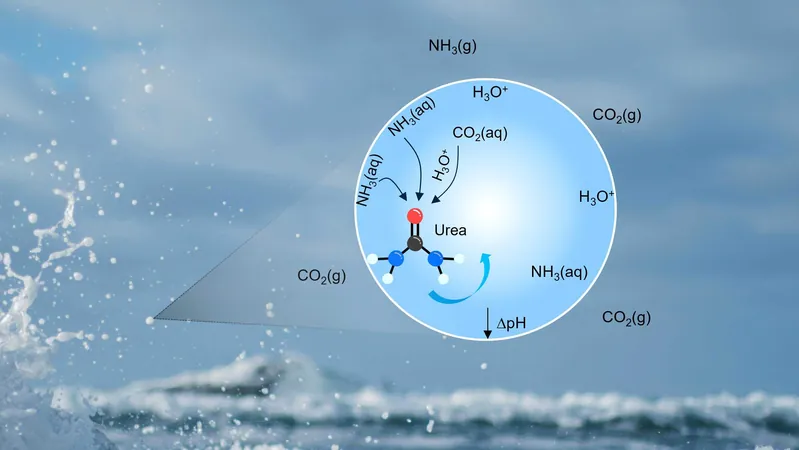
Revolutionary Discovery: How Mist and Sea Spray Might Unlock the Secrets of Life's Origin
2025-06-26
Author: Emma
A Breakthrough in Understanding Urea Formation
Urea, a molecule long considered essential for the origin of life, has revealed a groundbreaking pathway for its spontaneous formation, leading researchers to re-examine how life on Earth may have begun.
The Multi-Faceted Importance of Urea
This seemingly simple compound isn't just a laboratory curiosity; it's a powerhouse in the industrial world. Urea plays vital roles in fertilizers, synthetic resins, explosives, and even as a cleaner for car exhaust systems. Moreover, scientists speculate that it served as a fundamental building block for crucial biological molecules like RNA and DNA.
A Surprising Find: Spontaneous Formation on Water Surfaces
Led by Ruth Signorell of ETH Zurich, a research team has unveiled an unexpected method for urea synthesis that shuns the typical high-pressure, high-temperature setups or chemical catalysts. Instead, this research, published in the esteemed journal Science, reveals that urea can form directly on the surface of water droplets.
The Reactor in Every Droplet
Imagine tiny droplets from sea spray or mist acting as microscopic reaction vessels. Signorell's team discovered that under normal atmospheric conditions, urea can form from ammonia and carbon dioxide right at the water surface. The unique chemical environment created at the air-water interface facilitates this spontaneous reaction.
Energy-Free Chemistry: A Game Changer for Evolution
One of the study's authors, Mercede Mohajer Azizbaig, expressed excitement over the fact that this reaction occurs without any external energy. This finding not only has technical implications but also casts light on potential evolutionary processes during Earth’s formative years.
Connecting Dots in the Origin of Life Debate
With the origin of life being a hotbed of scientific inquiry, this discovery adds a significant piece to the puzzle. As first author Pallab Basuri states, the validation of their observations through theoretical calculations underscores the reliability of their findings.
Implications for Early Earth Conditions
The study suggests that similar reactions could have happened in the CO₂-rich atmosphere of early Earth, teeming with ammonia. Aqueous aerosols or fog droplets might have acted as natural reactors, paving the way for the formation of vital precursor molecules like urea.
A Paradigm Shift in Our Understanding of Life's Origins
Signorell concludes that mundane elements, such as water interfaces, could serve as dynamic spaces for chemical reactions, implying that the origins of biological molecules could be more intertwined than previously thought.









 Brasil (PT)
Brasil (PT)
 Canada (EN)
Canada (EN)
 Chile (ES)
Chile (ES)
 Česko (CS)
Česko (CS)
 대한민국 (KO)
대한민국 (KO)
 España (ES)
España (ES)
 France (FR)
France (FR)
 Hong Kong (EN)
Hong Kong (EN)
 Italia (IT)
Italia (IT)
 日本 (JA)
日本 (JA)
 Magyarország (HU)
Magyarország (HU)
 Norge (NO)
Norge (NO)
 Polska (PL)
Polska (PL)
 Schweiz (DE)
Schweiz (DE)
 Singapore (EN)
Singapore (EN)
 Sverige (SV)
Sverige (SV)
 Suomi (FI)
Suomi (FI)
 Türkiye (TR)
Türkiye (TR)
 الإمارات العربية المتحدة (AR)
الإمارات العربية المتحدة (AR)